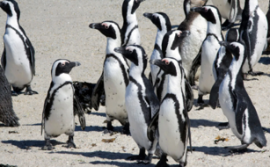
PRETORIA, APRIL 27 (NNN-SANEWS) — As the world marks World Penguin Day, South Africa has reaffirmed its commitment to protecting one of its most iconic yet critically endangered species — the African penguin.
The Department of Forestry, Fisheries, and the Environment (DFFE) has outlined bold steps being taken to halt the dramatic population decline of these seabirds, which have seen their numbers plummet to fewer than 9,000 breeding pairs in the country.
“The African penguin faces critical complexities, with fewer than 9,000 breeding pairs remaining in South Africa, earning them a critically endangered status. Climate change, overfishing, oil spills, and maritime noise pollution have driven steep declines, but our department, alongside dedicated partners, is taking bold action to reverse this trajectory,” said Minister of Forestry, Fisheries and the Environment, Dr Dion George.
The Minister described the African penguin as “a beloved symbol of South Africa’s rich biodiversity and a species at the heart of conservation efforts”.
“As we mark World Penguin Day, I call on all South Africans to join us in protecting these remarkable creatures. Their survival reflects the health of our oceans and our commitment to a sustainable future,” George said.
In a landmark development this March, a court-backed agreement between the fishing industry and leading conservation organisations — BirdLife South Africa and the Southern African Foundation for the Conservation of Coastal Birds (SANCCOB) — was announced.
The deal establishes biologically significant no-fishing zones around six critical penguin breeding sites: Dassen Island, Robben Island, Stony Point, Dyer Island, St Croix Island, and Bird Island. These areas account for 76% of the country’s African penguin population.
“This agreement, now an order of the court, establishes biologically meaningful no-fishing zones around six key penguin colonies -notably, 12-mile fishing closures around Robben Island and Bird Island, alongside tailored restrictions at other sites, will secure vital sardine and anchovy stocks for penguins over the next decade.
“This achievement was forged by the DFFE through dialogue with the fishing industry, and balances ecological and economic needs, proving collaboration can deliver results.”
The department is also confronting the devastating environmental consequences of bunkering — ship-to-ship fuel transfers — in Algoa Bay, near St Croix Island, formerly the largest African penguin colony in the world.
“Oil spills and underwater noise from ship-to-ship refuelling have decimated this population. Following a pause in bunkering activities in 2023, we observed a small but encouraging recovery at St Croix.
“Our department is now advancing stricter bunkering regulations to permanently restrict such activities in sensitive ecological zones, safeguarding penguins from further harm,” said the Minister.
In addition to these efforts, government is bolstering Marine Protected Areas to enhance fish stocks, backing SANCCOB’s work in rehabilitating injured penguins, and funding research to continuously refine conservation strategies.
“Partnerships with organisations like SANCCOB, who recently released rehabilitated penguins like Hope back to the wild, inspire us all,” George said. — NNN-SANEWS






